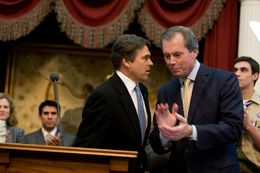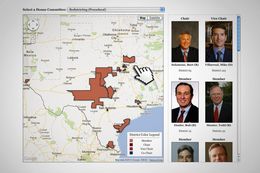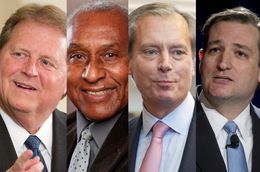
The Patient Protection and Affordable Care Act, President Obama’s signature health care legislation, is constitutional — including the individual mandate that forces Americans to carry health insurance, the U.S. Supreme Court ruled Thursday.
What that decision means for Texas, where leaders have ardently opposed “Obamacare” despite the state's sky-high rate of uninsured residents, is complicated, both by politics and by the state's history of rejecting federal dollars.
In a 5-4 decision, the high court upheld the health reform provision that requires all citizens to carry insurance coverage — a major win for Democrats, and a serious blow to Republican opponents, including Texas Attorney General Greg Abbott, who sued the federal government on Texas' behalf along with 25 other states. (Read the ruling here.)
The health reform law also dramatically expands Medicaid, which already makes up close to a quarter of Texas’ state budget, although the Supreme Court ruled that the federal government may not withhold Medicaid funds from states that reject the expansion — and the money that comes with it.
In the aftermath of the Supreme Court decision, Texas' Republican leaders haven't yet said what approach they'll take.
They'll likely rush to implement a health insurance exchange — a state marketplace for the public to shop for deals on health insurance that the federal government will instate if Texas doesn't do it.
But Texas officials have a history of rejecting federal dollars for programs they disagree with, and the Medicaid expansion will likely be no exception. Republican consultants say they think it's likely that Texas will reject the Medicaid expansion — and the billions of federal dollars that come along with it — at least at first. They say it's the principle (it's hard to accept money for something you've railed against in this political environment) and also the reality: The state's Medicaid program is already running billions of dollars short, and they argue that enrolling even more poor adults isn't possible until Texas rights its own ship.
"We’ll work closely with Gov. Perry, state leaders and the attorney [general] to fully analyze the ruling, but I’m pleased that it gives states more ability to push back against a forced expansion of Medicaid," Health and Human Services Commissioner Tom Suehs said in a statement. "I remain concerned that expanding Medicaid without reforming it only multiplies the tremendous budget pressure the program puts on states. Medicaid already consumes a quarter of the state budget in Texas, and enrollment and costs would mushroom under the Affordable Care Act."
Republican consultants also believe that the Supreme Court ruling that the federal government can't withhold Medicaid funds puts Texas on slightly better footing to negotiate with the Centers for Medicare and Medicaid for possible waivers to help with an expansion down the road. In the last legislative session, Texas received one federal waiver; the feds rejected a second.
Abbott said after Thursday's ruling that the justices' decision that "Congress does not have the authority to force states into the Medicaid expansions" is a win for states' rights, and for Texas.
"In the end, it was a victory, even though it was not the outcome we wanted," he said.
If Texas does accept federal funding to expand Medicaid, the costs to the state will be minimal for the first few years — and ramp up slightly in subsequent years. Though they're not minimal, especially in a state already struggling to fund existing Medicaid enrollees, the match provides a deal that health reform supporters say is far too good for Texas to pass up.
The flow of federal funding to Texas under health reform has already begun, albeit not through a Medicaid expansion. The Health Care Innovation Awards, which have granted more than $40 million to Texas-based health care projects, were funded under the law. Earlier this month, the U.S. Department Health and Human Services awarded about $5.3 million to health centers in Texas under the act.









